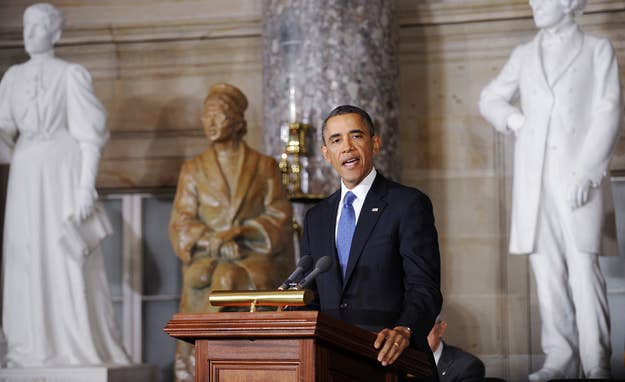
WASHINGTON — The Obama administration faces a Thursday deadline on what might become its biggest legacy on gay rights; the question of if it will weigh in on the Supreme Court case challenging California's Proposition 8 marriage ban.
No one appears to know what's going to happen, and if they do, they won't say. If the administration does file an amicus curiae, or friend of the court, brief, the filing — depending on its scope — could be a landmark moment in the path toward LGBT equality under the law.
Although President Obama has held the view since February 2011 that it is unconstitutional for the federal government to refuse to recognize same-sex couples' marriages that are legally recognized by the states, Obama has refused to say whether it is unconstitutional for states themselves to refuse same-sex couples the right to marry.
Obama has said the matter should be debated at the state level — leading some to criticize him for holding a "states' rights" position — but he often has pointed to the fact that the courts also would play a role in those decisions.
So while the administration has told the Supreme Court that it should hold the Defense of Marriage Act's federal definition of marriage as unconstitutional, Obama wouldn't say as recently as last week whether the administration would weigh in on Proposition 8.
Solicitor General Donald Verrilli, the official who files the administration's briefs with the Supreme Court, was consulting with the White House on the decision.
If the government argues the Constitution requires same-sex couples be allowed equal rights to marry, it would be a landmark announcement that would dramatically raise the stakes for the March 26 oral arguments in the case.
The administration could take a lesser route, arguing states that extend all of the benefits of marriage to same-sex couples have no constitutional basis for refusing to treat those relationships as marriage. It also could argue that the appeals court ruling, based on California's unique position of repealing a statewide decision that allowed same-sex couples to marry, is the correct route, which likely would only directly impact California.
If the administration sits out, however, be prepared for a lot of disappointment and likely anger from LGBT advocates and allies.
Notably, expect to be reading Obama's inaugural quote on gay rights — when he said that "[o]ur journey is not complete until our gay brothers and sisters are treated like anyone else under the law" — being read back to him by LGBT advocates.
